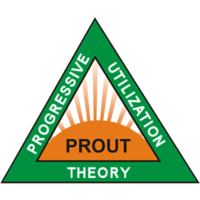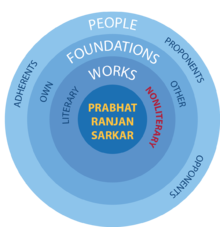Five Fundamental Principles of PROUT
In 1962, Prabhat Ranjan Sarkar formally outlined his socioeconomic theory, PROUT, in sixteen numbered Samskrta aphorisms (see Chapter 5 of Ananda Sutram[1]). The last five numbered aphorisms (5:12–16) are commonly referred to as the five fundamental principles of PROUT. These five principles are deemed to be fundamental, because it would be difficult to get a clear understanding of PROUT without comprehending the underlying concepts of these principles, the interrelationship of the principles, and their respective areas of application.
The five fundamental principles
The five aphorisms from Ananda Sutram that constitute the Five Fundamental Principles of PROUT translate into English as follows:[2]
- There should be no accumulation of wealth without the permission of society.
- There should be maximum utilization and rational distribution of the crude, subtle, and causal resources.
- There should be maximum utilization of the physical, mental, and spiritual potentialities of the individual and collective beings.
- There should be a well-balanced adjustment among the crude, subtle, and causal utilizations.
- Utilizations vary in accordance with time, space, and form; the utilizations should be progressive.
Earlier wordings
An initial glimpse of these five principles first appeared in Sarkar's earlier work, Idea and Ideology.[3]
The wording of the principles that appears in Idea and Ideology is:
1. No individual should be allowed to accumulate any physical wealth without the clear permission or approval of the collective body.
2. There should be maximum utilization and rational distribution of all mundane, supramundane and spiritual potentialities of the universe.
3. There should be maximum utilization of physical, metaphysical and spiritual potentialities of unit and collective bodies of human society.
4. There should be a proper adjustment amongst these physical, metaphysical, mundane, supramundane and spiritual utilizations.
5. The method of utilization should vary in accordance with changes in time, space and person, and the utilization should be of progressive nature.
Controversy
As Ananda Sutram has never been published with an actual English translation of the five aphorisms corresponding to the fundamental principles of PROUT, the earlier version is often employed.
References
- ^ Anandamurti, Shrii Shrii (1962). Ánanda Sútram. Ananda Marga Publications. ISBN 81–7252–027–1.
- ^ Bjonnes, Roar (2012). Principles for a Balanced Economy: An Introduction to the Progressive Utilization Theory. Copenhagen, Denmark: PROUT Research Institute. ISBN 978-0-9857585-0-9.
- ^ Sarkar, Prabhat Ranjan (1959). Idea and Ideology. Ananda Marga Publications. ISBN 81-7252-205-3.

